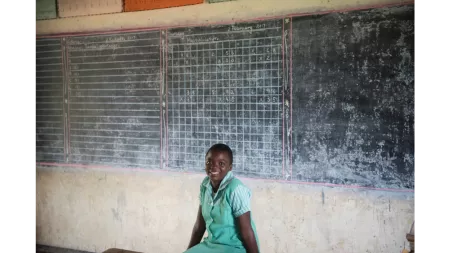CARE International in Zimbabwe, through the Global Affairs Canada (GAC)-funded Supporting Transition, Retention and Training for Girls (START4Girls) project, is working with community leaders, male champions, child protection committees and the government of Zimbabwe (GoZ) to challenge community perceptions and build awareness around the barriers that young women face in accessing education and the role that key community members and stakeholders can play in encouraging and supporting young women to access education Buhera and Mutare rural districts of Zimbabwe.
These districts have high rates of child marriages among other social norms harmful to girls. CARE, through the project, is collaborating with partners to strengthen the agency and capacities of adolescent girls and young women through targeting socio-economic barriers that hinder girls' access to education. Increase in early marriage rates and transactional sex as a coping mechanism in response to food and economic insecurity further compounds the risks for adolescent girls' and young women’s halted education.
Through the START4Girls project, Child Protection Committees are facilitating conversations around the girl child and are now moving into the communities to enhance the knowledge on children’s rights. This is helping to protect girls from abuse.Tinashe - School leader of the Junior School Development Committee
START4GIRLS targets adolescent girls and young women aged 12-22 years through a combination of proven methodologies for girl and women-centred community-led dialogue and decision-making and innovative partnerships, practices, and models.
Through the establishment of girls’ leadership camps, setting up opportunities for mentorship, and building peer-to-peer platforms where young women can discuss the issues they face and solve the problems together, START4Girls is creating safe spaces where girls and young women can become young leaders, supporting each other to realise their full potential.
The START4Girls project is improving attendance, retention, completion and transition rates of adolescent girls and young women including those with disabilities, across secondary education and vocational training in two rural districts (Buhera and Mutare) of Zimbabwe.
Ropafadzo - Peer Leader
Meet Ropafadzo, a peer leader at St Johns High School in Murambinda who is advocating against child marriages and helping other young girls realise their full potential by boosting their self-confidence.
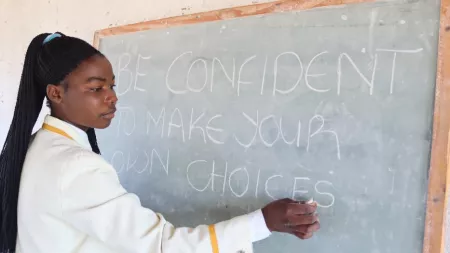
As a peer leader I am advocating for the rights of girls through challenging harmful gender norms and strengthening girls’ agency to be confident and to make decisions that shape their future. Everyone should be able to say ‘No’ and not to be passive. This has brought discipline at school and both boys and girls are now more confident to report abuse and say no to harmful practices that affect them.
Selma - Peer Leader
Selma is peer leader and mentor at St Johns High School in Murambinda. She attended girls’ leadership camps in 2021 and is now a role model at her school. She works with her teachers to engage other students in peer-to-peer platforms where they discuss the issues they face as well as craft solutions to solve them.
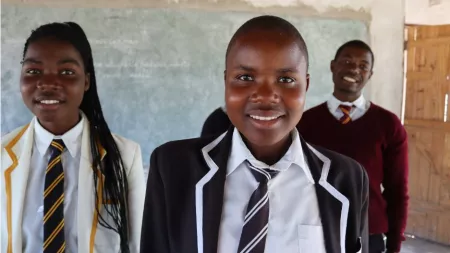
“After receiving peer leader training, we are influencing other learners to be confident in themselves and have positive influence on others. A student must not be passive but should be able to say no to harmful practices and negative peer pressure. Every child must understand their rights, such as; the right to food, education, and shelter, and have knowledge of what to do when abused. The emphasis is not only on our rights, but also on our responsibilities as children. I am now a role model for many students. The school is also giving us an opportunity to lead by example and even chair assembly sessions. Our roles at school have encouraged attendance among other learners, and as learners we now have understanding that we can dream big. Even those who have left school are coming back inspired to do better. My vision is to go to university and be an engineer.”
Tinashe - Junior School Development Committee
Tinashe is a peer leader at St Johns High School. He also leads the Junior School Development Committee (JSDC) a platform advocating for inclusive development for all students as the school. He is also a gender champion working with other boys to facilitate an enabling environment where girls are treated with dignity and respect.
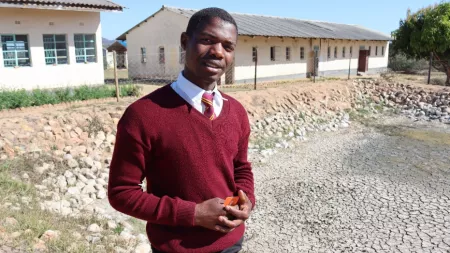
“I am advocating for learners to have a better learning environment and facilities. As a Junior School Development Committee (JSDC) member, I encouraged school authorities to provide for girl friendly facilities including girl-friendly toilets to ensure protection of girls. Girls are no longer sent away from school even if they are pregnant. They have a chance to learn with others. We work with our Guidance and Counselling teacher to make sure girls are also supplied with sanitary wear so that they do not miss school. Through the START4Girls project, Child Protection Committees are facilitating conversations around the girl child and are now moving into the communities to enhance the knowledge on children’s rights. This is helping to protect girls from abuse. In our advocacy, we are also showing other learners that we must be responsible. We have started horticulture projects, which supplement the school feeding programme and contribute to funds for classroom furniture. We are currently looking into expanding our projects and we will be starting fish farming soon.”
Education has become the center.Gideon - Guidance and Counselling (G&C) Teacher at St Johns High School
Laiza Magaya - Social Analysis and Action (SAA) Facilitator and Parent
Meet Laiza, a SAA facilitator working with community members and leaders in Murambinda to build awareness around harmful practices and barriers that adolescent girls face in accessing education. She also works with local government structures to safeguard girls in ensuring that child marriages are a thing of the past in her community.
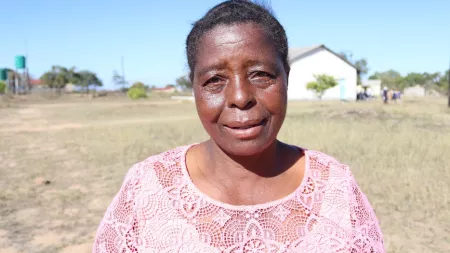
“As a SAA facilitator, my role is to monitor the environment and make sure that both girls and boys have a favorable childhood. We engage with other parents and discuss about the importance of education and stereotypes and harmful practices such as child marriages which were very rife in the past. We also meet community leaders at all levels to voice the concerns of particularly girl children who have been marginalized by societal norms. Due to the discussions, we have started seeing positive changes in the communities and schools as many girls who got pregnant are now willing to come back to school. It is now difficult for children to be married off and people keep quiet in the community – this is completely different from how things used to happen.”
Gideon - Guidance and Counselling (G&C) Teacher
Meet Gideon, St Johns High School's Guiding and Counselling teacher who has been equipped by CARE International to facilitate proper guidance to students extending knowledge on gender equality, sexual and reproductive health, child protection, hygiene, menstrual hygiene, among others.
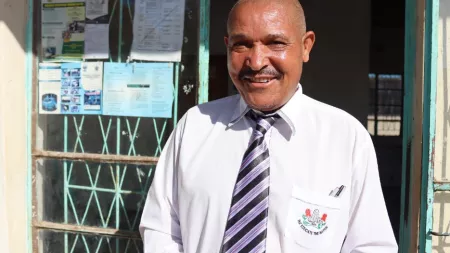
“When learners returned to school after the Covid-19 lockdowns, there was no discipline. Some girls had fallen pregnant so when schools opened it was chaotic. We made efforts to speak to learners at our school to guide them on the importance of education. The girls’ leadership camps facilitated by the CARE START4Girls project really helped to instill discipline and set a new trend especially among adolescent girls. All of them wanted to be associated with START4Girls and were dreaming bigger. Education has become the center. Girls who dropped out due to pregnancy are now confident and know they can attend school despite falling pregnant, but most of them prefer to come back after giving birth. The START4Girls project also instilled a sense of responsibility among students. The children recently mobilized donations for a girl to come for Advanced level after she passed her Ordinary level and faced financial challenges. She is very bright but comes from a very vulnerable family.”
